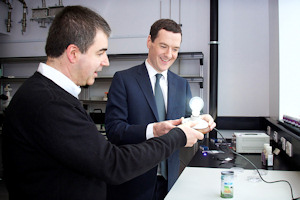
Image Credit: Myimagine | Shutterstock.com
A strategic partnership between the National Graphene Institute (NGI) at the University of Manchester and a spin-off company has led to the development of a new graphene-based lightbulb with lower energy emissions, minimal manufacturing costs and a longer lifetime.
 Chancellor George Osborne and Sir Kostya Novoselov with the graphene lightbulb
Chancellor George Osborne and Sir Kostya Novoselov with the graphene lightbulb
Graphene Lighting PLC, the UK based company who will be manufacturing these graphene-based lightbulbs, is a start-up company which grew out of a partnership with the NGI at the University of Manchester in order to create graphene applications.
When compared to conventional LED bulbs, the graphene lightbulb is designed to provide improved and longer lasting performance.
Graphene Lighting PLC plans to bring these lightbulbs to the commercial market within a few months time at competitive cost.
In order to ensure that the University of Manchester benefits from the commercial applications which are growing out of the NGI, the university has a stake in Graphene Lighting PLC. The graphene lightbulb is the first marketable graphene application to originate from the UK.
It is also the first application to be created in partnership with the NGI, which began was officially opened last week by George Osbourne.
In 2004, Sir Andre Geim and Sir Kostya Novoselov from the University of Manchester were the first to isolate graphene, research for which they were credited with the Nobel Prize for Physics in 2010.
The University of Manchester has become the pioneering home of graphene, with over 200 researchers and an unmatched number of graphene and 2D material research projects.
The graphene lightbulb is proof of how partnering with the NGI can deliver real-life products which could be used by millions of people. This shows how The University of Manchester is leading the way not only in world-class graphene research but in commercialisation as well.
James Baker, Graphene Business Director
The NGI will operate not only on an academic level but will also be partnering with companies interested in developing futuristic graphene applications.
The University of Manchester plans to inaugurate the Graphene Engineering Innovation Centre (GEIC) in 2017 in order to speed up the process of manufacturing marketable products.
This lightbulb shows that graphene products are becoming a reality, just a little more than a decade after it was first isolated – a very short time in scientific terms. This is just the start.
Our partners are looking at a range of exciting applications, all of which started right here in Manchester. It is very exciting that the NGI has launched its first product despite barely opening its doors yet.
Professor Colin Bailey, Deputy President and Deputy Vice-Chancellor of the University of Manchester
The Engineering and Physical Sciences Research Council (EPSRC) and the European Regional Development Fund (ERDF) have provided the NGI with funds of £38 million fund £23 million.